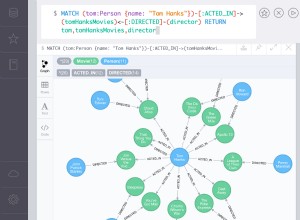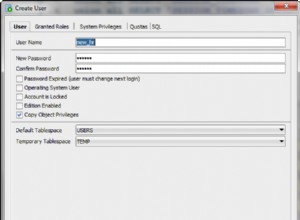Você configura cada identificador de cURL da mesma maneira e os adiciona a um
curl_multi_ lidar com. As funções a serem observadas são as curl_multi_* funções documentadas aqui
. Na minha experiência, porém, houve problemas ao tentar carregar muitos URLs de uma só vez (embora não consiga encontrar minhas anotações no momento), então a última vez que usei curl_mutli_ , configurei para fazer lotes de 5 URLs por vez. editar :Aqui está uma versão reduzida do código que tenho usando
curl_multi_ :editar :Ligeiramente reescrito e muitos comentários adicionados, que esperamos ajudar.
// -- create all the individual cURL handles and set their options
$curl_handles = array();
foreach ($urls as $url) {
$curl_handles[$url] = curl_init();
curl_setopt($curl_handles[$url], CURLOPT_URL, $url);
// set other curl options here
}
// -- start going through the cURL handles and running them
$curl_multi_handle = curl_multi_init();
$i = 0; // count where we are in the list so we can break up the runs into smaller blocks
$block = array(); // to accumulate the curl_handles for each group we'll run simultaneously
foreach ($curl_handles as $a_curl_handle) {
$i++; // increment the position-counter
// add the handle to the curl_multi_handle and to our tracking "block"
curl_multi_add_handle($curl_multi_handle, $a_curl_handle);
$block[] = $a_curl_handle;
// -- check to see if we've got a "full block" to run or if we're at the end of out list of handles
if (($i % BLOCK_SIZE == 0) or ($i == count($curl_handles))) {
// -- run the block
$running = NULL;
do {
// track the previous loop's number of handles still running so we can tell if it changes
$running_before = $running;
// run the block or check on the running block and get the number of sites still running in $running
curl_multi_exec($curl_multi_handle, $running);
// if the number of sites still running changed, print out a message with the number of sites that are still running.
if ($running != $running_before) {
echo("Waiting for $running sites to finish...\n");
}
} while ($running > 0);
// -- once the number still running is 0, curl_multi_ is done, so check the results
foreach ($block as $handle) {
// HTTP response code
$code = curl_getinfo($handle, CURLINFO_HTTP_CODE);
// cURL error number
$curl_errno = curl_errno($handle);
// cURL error message
$curl_error = curl_error($handle);
// output if there was an error
if ($curl_error) {
echo(" *** cURL error: ($curl_errno) $curl_error\n");
}
// remove the (used) handle from the curl_multi_handle
curl_multi_remove_handle($curl_multi_handle, $handle);
}
// reset the block to empty, since we've run its curl_handles
$block = array();
}
}
// close the curl_multi_handle once we're done
curl_multi_close($curl_multi_handle);
Dado que você não precisa de nada de volta dos URLs, provavelmente não precisa de muito do que está lá, mas foi assim que eu dividi as solicitações em blocos de
BLOCK_SIZE , esperou que cada bloco fosse executado antes de prosseguir e detectou erros do cURL. 



